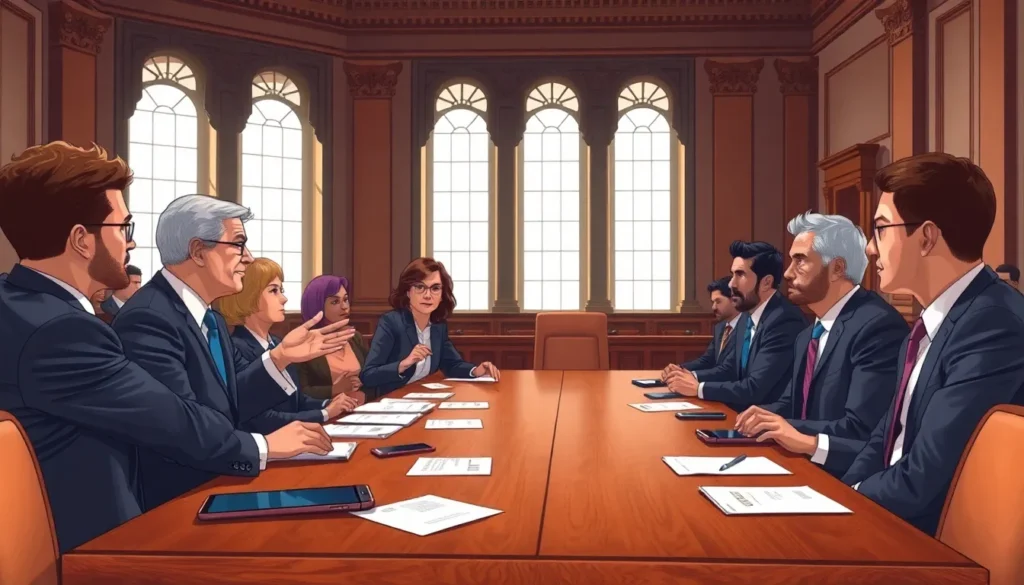In the grand theater of democracy, the legislature takes center stage, wielding the power to shape public policy like a master conductor leading a symphony. It’s not just about passing laws; it’s about crafting the very rules that govern society. Imagine a world where decisions affecting everyday life are made by a group of individuals who are as informed as a cat on the internet—now that’s a recipe for chaos!
Table of Contents
ToggleUnderstanding the Legislature
The legislature plays an essential role in the public policy process. It serves as the primary law-making body within a government, shaping legislation that impacts various aspects of societal functioning. Members of the legislature, such as senators and representatives, engage in debates, propose bills, and vote on proposed laws, ensuring diverse perspectives are heard.
Legislative committees often focus on specific issues, evaluating proposed policies before they reach the full legislature. These committees conduct hearings, gather expert testimony, and review relevant data, allowing for in-depth examination of complex issues. Through this process, legislators gain insights essential for informed decision-making.
Additionally, the legislature holds the executive branch accountable. By conducting hearings and investigations, it investigates the implementation of policies and programs. This oversight function safeguards the integrity of governmental actions and ensures that public resources are utilized effectively.
Public participation also plays a vital role in the legislative process. Citizens can influence legislation by engaging with their elected officials, providing testimony during hearings, or participating in advocacy efforts. Such engagement reinforces democratic principles by placing the power of policy-making in the hands of the constituents.
Legislators are tasked with balancing competing interests while promoting the common good. They must navigate complex political landscapes, negotiate with stakeholders, and seek compromises that reflect the needs of their constituents. Through these efforts, the legislature facilitates a structured approach to address public concerns and drive societal progress.
Key Functions of the Legislature

The legislature plays a crucial role in shaping public policy, with several key functions guiding its operations.
Lawmaking
Lawmaking remains the cornerstone function of the legislature. Members propose, debate, and vote on bills that govern society. Committees evaluate these proposals, ensuring rigorous scrutiny before reaching the larger legislative body. Evidence-based discussions drive the decision-making process. Each law passed reflects the interests and needs of constituents. Diverse perspectives influence outcomes, allowing for comprehensive legislation that addresses societal issues.
Representation
Representation serves as a vital function of the legislature. Senators and representatives advocate for the interests of their constituents, ensuring that diverse voices are heard. Public engagement through town halls or forums enhances this process, providing legislators with firsthand insight into community concerns. Members must balance competing interests while promoting the common good. Continual outreach fosters accountability, helping constituents feel connected to their representatives.
Oversight
Oversight establishes a critical check on executive power. The legislature monitors the implementation of laws and policies, ensuring accountability in government actions. Investigations into executive decisions often reveal necessary adjustments or reforms. Hearings allow for expert testimonies, equipping legislators with essential information. This oversight role safeguards the integrity of governmental processes and reinforces public trust in democracy. Each oversight effort contributes to a transparent and responsive government.
The Policy Process
The legislature plays a vital role in shaping public policy through various stages of the policy process. It guides issues from initial discussions to implementation.
Agenda Setting
Agenda setting refers to the process where the legislature identifies issues needing attention. Policymakers listen to constituents and interest groups, prioritizing topics that impact citizens. Through hearings and public forums, legislators gather input, shaping the legislative agenda. They determine which issues merit discussion and action. Civic engagement influences this stage as active participation signals public concern. Diverse voices help legislators recognize pressing community needs and interests.
Decision Making
Decision making occurs as legislators evaluate proposed policies and bills. Elected officials debate the merits, considering input from stakeholders. Committees analyze details, holding hearings to gather expert testimony. This process enables legislators to understand complex issues fully. Voting marks the decisive moment where decisions are formalized. Transparency in this stage fosters trust among constituents, allowing them to track legislative actions. Competing interests shape discussions, ensuring diverse perspectives are considered in the final decisions.
Implementation
Implementation is the phase where enacted policies are put into practice. The executive branch carries out the laws, guided by legislative intent. Legislators oversee this process, monitoring execution to ensure alignment with policy goals. Accountability measures help assess the effectiveness of implemented policies. Feedback loops allow for adjustments based on real-world impacts. Public input remains crucial during implementation as constituents evaluate the outcomes. This collaboration strengthens democratic governance and assists in refining future policies.
Impact of the Legislature on Public Policy
The legislature significantly influences public policy through various mechanisms. Legislative actions affect governance, shaping societal structures and individual lives.
Case Studies
Examples highlight the legislature’s role in policy development. In 2010, the Affordable Care Act expanded healthcare access nationwide. This comprehensive law emphasized the importance of legislative action in addressing public health needs. Another case, the Marriage Equality Act, showcases how legislators responded to constituents’ demands for equal rights. Such legislation reflects the commitment to fairness, demonstrating the dynamic interaction between elected officials and their communities.
Challenges Faced
Legislators encounter numerous challenges in the policy-making process. Balancing competing interests poses a significant difficulty, especially when addressing diverse constituent concerns. Additionally, navigating political polarization complicates collaboration, often hindering effective decision-making. Time constraints arise during legislative sessions, limiting thorough debates and analysis. Furthermore, external pressures from lobbyists can influence legislative priorities. Addressing such challenges requires legislators to remain adaptable and focused on their constituents’ needs.
The legislature plays an indispensable role in shaping public policy and ensuring democratic governance. By actively engaging in lawmaking representation and oversight it provides a structured approach to address societal needs. Through thoughtful deliberation and public participation legislators can navigate complex issues while balancing competing interests. Their ability to adapt and respond to constituents’ concerns ensures that policies reflect the diverse perspectives of the community. As the primary law-making body the legislature not only crafts laws but also fosters accountability and transparency in government actions. This dynamic process ultimately drives progress and enhances the quality of life for citizens.



